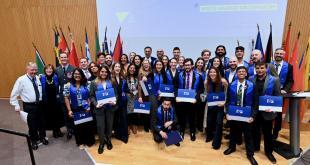 The Space Generation Advisory Council (SGAC) is carrying out critical work in terms of inspiring and guiding young people that wish to forge careers in the space industry. This support is provided by a dedicated team working at SGAC that are constantly focused on the delivery of the organisation’s vision. Torsten Kriening spoke to Andrea Jaime, former Executive Director of SGAC to find out more about its importance to our future space sector and its work.
The Space Generation Advisory Council (SGAC) is carrying out critical work in terms of inspiring and guiding young people that wish to forge careers in the space industry. This support is provided by a dedicated team working at SGAC that are constantly focused on the delivery of the organisation’s vision. Torsten Kriening spoke to Andrea Jaime, former Executive Director of SGAC to find out more about its importance to our future space sector and its work.
Can you begin by telling me about the history of SGAC ?
SGAC was founded in 1999, when the United Nations (UN) was holding the big space conference: UNISPACE III in Vienna. The UN asked the International Space University (ISU) if they would like to organise a youth conference to see what level of interest they could get from young people, because they would be indeed the future leaders of space. The ISU agreed and they were invited to come to the UN to attend the UNISPACE III side event, the Space Generation Forum, for two weeks in order to come up with recommendations and ideas.
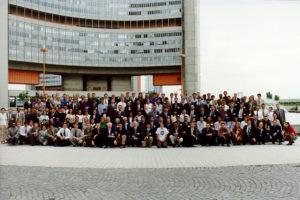
One of the recommendations that they made was to create a youth association or advisory council to the UN and that’s how SGAC was created. Since 1999 it has evolved a lot. Since then, there have been annual conferences, and the Space Generation Congress, where we meet to discuss recommendations made to the UN in more depth. Then, in 2006, it was decided that SGAC needed to get an office to establish the organisation properly, and to allow it to grow. So SGAC decided to locate in Vienna, close to the UN. The European Space Policy Institute (ESPI) welcomed us into their offices, so the main challenge back then was to establish the whole organisation and to ensure that it was going to survive. After this period, the organisation started to move to a higher level. We reached into the American space sector and established a second event in the US, the Space Generation Fusion Forum, during the Space Symposium. I became part of SGAC as Executive Director in the period between 2011 and 2014.
You give the interested youth a voice at the UN? Is this on an international basis? How does it work? How can someone participate?
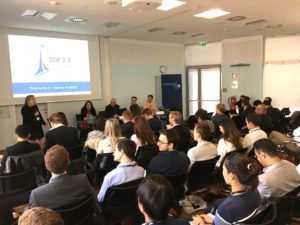
Exactly. Space activities take along time – a project can take up to ten years or more. The space sector realised that the young professionals of today are the ones that will be the leaders of the projects that we are now just beginning. The senior professionals also see the value of having the input from the young professionals. In SGAC, we categorise the young professionals and the students as members of SGAC and that age group is between 18 years old to 35 years old. If you are over 35, you can still be part of the organisation as an alumni, or as an expert in some of our project groups. The organisation is completely international, and we have close to 14,000 members, so everybody across the world who has an interest in space can join, and there are many ways for a person to become involved with SGAC!
Are you looking for space professionals only or is it open to a wider audience?
It is open to anybody with an interest in space. As any non-profit, it depends on the members as to how much time they want to dedicate, how they volunteer and which activities they want to participate in. The more you put in, the more you get back from the organisation. So you can volunteer some of your time to organise events, to lead some of the pro
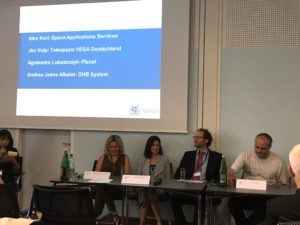
ject groups, to drive some of the technical output, to write reports, or even to design our logos! Then you get exposure at events and a valuable entry point into the space industry. I would say that for any young professional that would like to work or be part of the space community, SGAC is the perfect entry point because you get to meet everybody in the space sector.
This also means that you connect young professionals with potential corporations for internships, for example?
Exactly. One thing the organisation does very well is to bring together young professionals with senior professionals so they have a lot of mentors that come to our events and activities. This is a perfect and rare opportunity to make invaluable connections. You can work with senior industry professionals and they can see the potential you have. SGAC also has a recognised credibility in the space sector. It is well established so when you say you’re an active member of SGAC, everyone (agencies, industry, academia…) knows about it and recognises it. This can help you greatly in your professional career.
You address, with the UN, the core topics of today. You also address wider topics like women in aerospace or women in technology and capacity building. How can this be more effective? The space industry still employs less than 1 million people worldwide, so how can we engage with others?
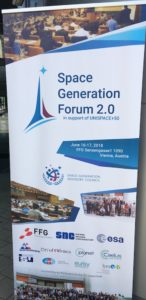 We did a good job to ensure that the organisation was reaching every side of the world by giving scholarships and making sure people from emerging nations could contribute to and learn from other space-faring nations. A community that has no space programme or no established university in the space domain, can initiate their own by being together with other young professionals and seniors. They can get ideas and be inspired by SGAC members to apply the same initiatives to their countries. This is something that is already happening and we are building on it.
We did a good job to ensure that the organisation was reaching every side of the world by giving scholarships and making sure people from emerging nations could contribute to and learn from other space-faring nations. A community that has no space programme or no established university in the space domain, can initiate their own by being together with other young professionals and seniors. They can get ideas and be inspired by SGAC members to apply the same initiatives to their countries. This is something that is already happening and we are building on it.
The next step, which would be very interesting, will be to reach outside of the space community as well. I think this is something we see coming out of this Space Generation Forum 2.0, because we are looking at space for global health or at global partnerships with industrial partners. When we talk about global health we need to reach out to the pharmaceutical domain and the medical arena. We need to show that space is multidisciplinary. You don’t just need space engineers. You need biologists, lawyers, policy makers, doctors, educators. This is the message we are really trying to push across at SGAC. One of the things that work very well at SGAC is making use of our network. Imagine if each member went to their school in their home towns and talks about space and its multidisciplinary nature. This would multiply our outreach like crazy. We want to encourage our members to be more active in this way, just go out and inspire others.
What is your story? What brought you into space?
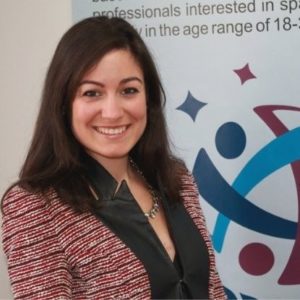
I currently work for OHB System in Germany. We develop space systems in all the areas of space: from navigation to Earth Observation to human space flight and exploration. I always liked space because I was fascinated by the Moon. When I was a kid, the Moon would follow me every night whether I would walk on the beach or travel in the back of the car with my parents. Why was it following me if I was moving? I wanted to know more about it. I also read a lot of books about witches who would always fly past the Moon. Then I realised that there are no witches flying to the Moon but astronauts do! I wanted to learn more about the space industry so I finished Aeronautical Engineering in Barcelona and I did my Master’s degree in aerospace.
I believed that the sky was not the limit. I wanted to know how I could contribute to space because I also think that space somehow unifies the Earth. From space we are all the same. At SGAC we work with people with the same passion and the same objective which is to work towards a better life on Earth for everybody.
What would be your advice for the current Executive Director at SGAC and to the new people you want to get on board?
I would say the main challenge is to make sure that the volunteers are happy with the work they are doing, that they have enough responsibilities but not too much because they are the ones that sustain the organisation. As Executive Directors, we are in office full time and we are paid for it. But the volunteers are the real ones behind the organisation, driving it. So the Executive Director needs to take great care to look after this network and make sure they are comfortable and actively contributing. For anybody who wants to join, do not wait any longer! There is no fee, so all you need to do is register on the website. If you don’t do anything else, the least you get are lots of relevant emails and information on scholarships, lectures, events and activities in your region that can only help you to develop your career. If you become more involved there are many positions available: organising teams, executive office, National Point of Contact, Project Groups… etc.
How can I as a corporate get engaged?
The best way is to become a sponsor of the organisation because this shows that you care about our mission, and as a non-profit there are things that we do have to pay for with cash, unfortunately. That’s how sponsors can help a lot. We have some companies bringing some funding into the organisation but we also ask them to bring their experts in to guide the young professionals, so corporations can also influence the direction of SGAC in terms of events or topics to be discussed, for example. We want industries and organisations to become involved and influence the community. Your company experts can also support working groups and review some of the outputs we create. So again, it’s a way for the industry to influence the future generation and to offer their expertise at an international level, while supporting a good cause acknowledged by the United Nations.
SpaceWatch.Global thanks Andrea Jaime of Space Generation Advisory Council for the interview.



